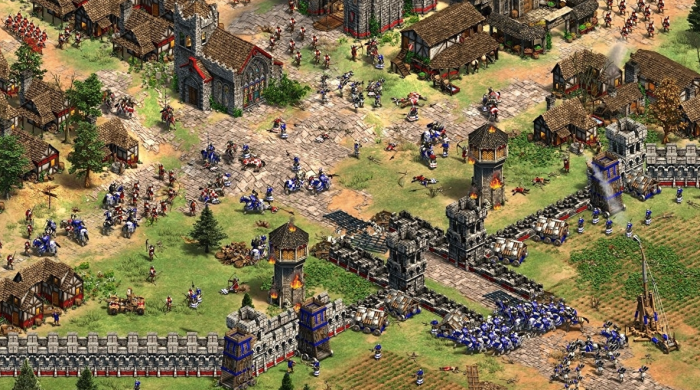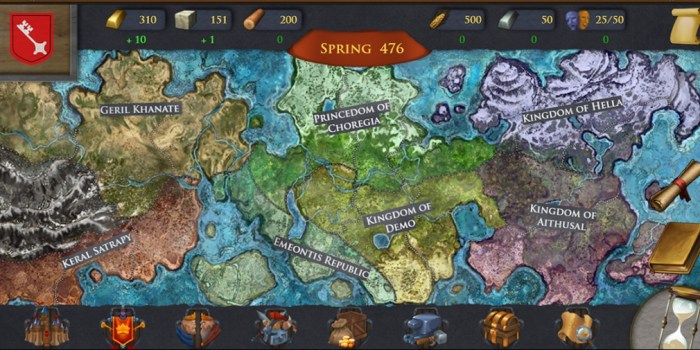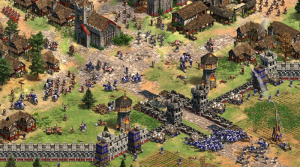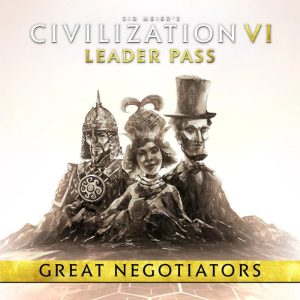
Welcome to the world of Empire Strategy Games, where you can build, conquer, and dominate your way to victory. Get ready to strategize, plan, and outsmart your opponents in this exciting genre of games.
From managing resources to forming alliances, every decision counts in these immersive gaming experiences. So, gear up and prepare to lead your empire to greatness!
Introduction to Empire Strategy Games
Empire strategy games are a genre of video games that focus on building and managing a virtual empire. Players are tasked with overseeing various aspects of their empire, including resource management, military strategy, diplomacy, and economic development.
Key Characteristics of Empire Strategy Games
- Strategic Planning: Players must carefully plan and execute their actions to ensure the growth and success of their empire.
- Empire Building: The main objective is to expand and build a powerful empire through conquest, diplomacy, and economic prowess.
- Resource Management: Managing resources such as gold, food, and materials is crucial for the sustainability of the empire.
- Military Warfare: Players engage in battles and conflicts to defend their empire and conquer new territories.
Popular Empire Strategy Games
- Age of Empires: A classic empire-building game that allows players to lead historical civilizations to greatness through strategic warfare and diplomacy.
- Civilization: A turn-based strategy game where players guide a civilization from ancient times to the modern era, focusing on cultural, technological, and military advancement.
- Crusader Kings: A grand strategy game that puts players in control of a medieval dynasty, where they must manage politics, family matters, and warfare to ensure the survival and prosperity of their dynasty.
Gameplay Mechanics in Empire Strategy Games
Empire strategy games are known for their intricate gameplay mechanics that require strategic planning and decision-making skills from players. Let’s delve into the typical gameplay mechanics found in these engaging games and how players manage resources to build thriving civilizations.
Resource Management
In empire strategy games, players are tasked with managing various resources such as gold, food, wood, and stone. These resources are essential for constructing buildings, training units, conducting research, and expanding their empire. Strategic allocation and efficient utilization of resources are crucial to maintain a balanced economy and progress in the game.
Civilization Building
Building civilizations in empire strategy games involves constructing different types of buildings like farms, barracks, markets, and universities. Each building serves a specific purpose, such as generating resources, recruiting units, conducting trade, or advancing technologies. Players must carefully plan the layout of their civilization to maximize efficiency and productivity.
Strategic Planning and Decision-Making
One of the key elements of empire strategy games is strategic planning and decision-making. Players need to make critical decisions on resource allocation, technology research, military tactics, and diplomatic relations. Each decision can have a significant impact on the outcome of the game, requiring players to think ahead and adapt to changing circumstances to ensure their empire’s success.
Multiplayer Features in Empire Strategy Games
In empire strategy games, multiplayer modes add a whole new dimension to the gameplay experience, allowing players to compete and collaborate with others in real-time.
Multiplayer Modes Available
- 1. Head-to-Head Battles: Players can face off against each other in direct combat, testing their strategic skills in intense one-on-one matches.
- 2. Team-based Modes: Some games offer team-based multiplayer modes where players can form alliances and work together to achieve common goals.
- 3. Co-op Campaigns: In cooperative multiplayer modes, players can join forces to complete missions or conquer objectives together.
Competitive Aspect of Multiplayer Gameplay
Multiplayer gameplay in empire strategy games often brings out the competitive side of players, as they strive to outwit and outmaneuver their opponents to secure victory.
Alliances and Diplomacy in Multiplayer Matches
Alliances and diplomacy play a crucial role in multiplayer matches, allowing players to form strategic partnerships, negotiate treaties, and engage in political maneuvering to gain an edge over their rivals.
Evolution of Empire Strategy Games
The evolution of empire strategy games has been a fascinating journey, spanning from classic titles to the modern iterations we see today. Technological advancements have played a significant role in shaping the gameplay mechanics, while graphics and player interfaces have continuously improved over time.
Classic Empire Strategy Games
- Classic empire strategy games, such as Civilization and Age of Empires, laid the foundation for the genre with turn-based gameplay and resource management.
- These early titles focused on strategic decision-making, city-building, and diplomacy to expand empires and conquer opponents.
- Graphics were simplistic, often using pixel art or basic 2D visuals, but the gameplay depth was unmatched.
Technological Advancements
- With the advancement of technology, empire strategy games have evolved to feature real-time gameplay, intricate AI systems, and dynamic environments.
- Improved processing power has allowed for larger maps, more units on screen, and complex simulations of economies and warfare.
- Online multiplayer capabilities have also become a standard feature, enabling players to compete and cooperate in massive virtual worlds.
Graphics and Player Interfaces
- Graphics in modern empire strategy games have reached new heights, with stunning 3D visuals, detailed landscapes, and realistic animations.
- Player interfaces have become more intuitive and user-friendly, providing easy access to information, commands, and strategic tools.
- HUD elements, tooltips, and tutorials help players navigate the complexities of empire management and warfare without feeling overwhelmed.
Community and Modding in Empire Strategy Games
Empire strategy games thrive on the vibrant community that surrounds them. Players come together to share strategies, tips, and engage in friendly competition. The community plays a crucial role in keeping the game alive and evolving.
Importance of Community in Empire Strategy Games
The community in empire strategy games provides a platform for players to connect, learn from each other, and form lasting friendships. It serves as a hub for discussions, debates, and the sharing of valuable insights that can enhance gameplay for everyone involved.
Modding Communities in Empire Strategy Games
Modding communities are a key element in expanding the gameplay experience of empire strategy games. These communities consist of talented individuals who create custom content, such as new maps, units, and gameplay mechanics. Mods add a new layer of creativity and excitement to the game, allowing players to tailor their experience to their preferences.
User-Generated Content in Empire Strategy Games
User-generated content, including mods, plays a significant role in extending the longevity of empire strategy games. By allowing players to create and share their own content, developers ensure that the game remains fresh and engaging long after its initial release. This user-generated content fosters a sense of ownership and investment in the game, keeping players coming back for more.
Crossover with Other Game Genres
Empire strategy games often intersect with other genres such as real-time strategy or simulation games, creating a unique gaming experience that combines elements from different genres.
Incorporating Real-Time Strategy Elements
Real-time strategy (RTS) games focus on quick decision-making and tactical gameplay, elements that are often integrated into empire strategy games to add a sense of urgency and dynamism. Players may need to manage resources in real-time, respond to enemy attacks swiftly, and adapt their strategies on the fly to succeed.
- Integrating RTS elements adds a layer of excitement and challenge to empire strategy games, keeping players engaged and on their toes.
- The inclusion of real-time battles or events tests players’ strategic thinking under pressure, simulating the chaos of warfare in a more interactive way.
- Players must balance long-term planning with immediate actions, creating a dynamic gameplay experience that rewards quick thinking and adaptability.
Incorporating Simulation Game Elements
Simulation games often focus on realistic representation and management of complex systems, which can be incorporated into empire strategy games to enhance the depth and immersion of gameplay. Elements such as city-building, population management, and economic simulation can add a realistic touch to empire strategy games.
- By incorporating simulation elements, empire strategy games offer players a more detailed and immersive experience, allowing them to oversee various aspects of their empire’s growth and development.
- Players can delve into the intricacies of resource management, infrastructure development, and societal needs, adding layers of complexity to their strategic decisions.
- Simulation elements provide a sense of realism and authenticity to empire strategy games, making the player feel like they are truly building and managing an empire from scratch.
Impact of Empire Strategy Games on Gaming Culture
Empire strategy games have had a significant impact on gaming culture, influencing not only player preferences and expectations but also shaping the broader gaming industry as a whole.
Evolution of Strategy Games
Over the years, empire strategy games have evolved from simple, turn-based simulations to complex, real-time strategy experiences. This evolution has set the standard for strategic gameplay in the industry, inspiring developers to create more intricate and engaging games.
Player Preferences
Empire strategy games have played a crucial role in shaping player preferences, with many gamers developing a fondness for deep, immersive gameplay experiences that require strategic thinking and long-term planning. This has led to an increase in demand for strategy games that offer complex decision-making and resource management mechanics.
Esports Scene
The competitive esports scene surrounding empire strategy games has grown significantly, with players and teams competing in tournaments for substantial prize pools. Games like StarCraft II and Age of Empires have become staples in the esports community, attracting a dedicated fan base and showcasing the strategic skill of top players.
Influence on Game Development
Empire strategy games have influenced game development trends, with many titles incorporating strategic elements into various genres. The success of empire strategy games has shown developers the value of engaging gameplay mechanics that challenge players to think critically and adapt to changing circumstances.
Battle Royale Games
Battle Royale games have gained immense popularity in the online gaming community in recent years. These games offer a unique gameplay experience that sets them apart from traditional empire strategy games.
Differentiation from Empire Strategy Games
- Battle Royale games focus on survival in a shrinking play area, where players must eliminate each other until only one remains, unlike empire strategy games that emphasize building and managing civilizations.
- The primary objective in Battle Royale games is to be the last player or team standing, while empire strategy games involve long-term planning, resource management, and diplomacy to achieve victory.
- Battle Royale games are fast-paced and intense, with a heavy emphasis on player skill and quick decision-making, in contrast to the more strategic and methodical gameplay of empire strategy games.
Key Gameplay Mechanics and Objectives in Battle Royale Games
- Players start with minimal equipment and must scavenge for weapons, armor, and resources to survive and eliminate opponents.
- The play area gradually shrinks, forcing players into closer combat and increasing the tension as the match progresses.
- Survival is paramount, as players must outlast others through combat skills, positioning, and strategic use of limited resources.
Popularity of Battle Royale Games
- Games like Fortnite, PUBG, and Apex Legends have attracted millions of players worldwide, creating a massive online community of fans and esports enthusiasts.
- The competitive nature and unpredictable outcomes of Battle Royale matches appeal to a wide range of gamers, from casual players to hardcore enthusiasts.
- Streaming platforms like Twitch and YouTube have played a significant role in the popularity of Battle Royale games, with many content creators showcasing their skills and entertaining audiences with intense gameplay moments.
Online Games Anime
Anime and online games often intersect, creating a unique gaming experience for players. The incorporation of anime-inspired visuals and storytelling in online games has become increasingly popular, attracting a wide audience of gamers who appreciate the art style and narrative elements commonly found in anime. Let’s dive into how anime and online games come together to create captivating gaming experiences.
Anime-Inspired Visuals and Storytelling
Anime-inspired visuals and storytelling are seamlessly integrated into online games, adding a distinct charm and appeal to the overall gameplay. From vibrant character designs to intricate world-building, anime influences can be seen in various aspects of online games. Developers leverage the popularity of anime aesthetics to create immersive gaming worlds that resonate with players who are fans of the art form.
Appeal to Players
The appeal of anime-themed online games lies in their ability to transport players to fantastical realms filled with colorful characters, engaging narratives, and visually stunning environments. Anime-inspired games often offer a unique blend of gameplay mechanics and storytelling elements that cater to both casual and hardcore gamers. The allure of exploring anime-inspired worlds, interacting with beloved characters, and experiencing epic adventures drives players to immerse themselves fully in these captivating online games.
Gaming Online
Online gaming has experienced exponential growth over the years, revolutionizing the gaming industry and transforming the way people interact with games. The rise of the internet and technological advancements have paved the way for a new era of gaming, where players can connect and compete with others from around the world in real-time.
Social Aspects of Online Gaming
Online gaming has brought about a social aspect to gaming like never before. Players now have the opportunity to form communities, join clans, and interact with others in multiplayer experiences. This social aspect has created a sense of camaraderie among players, fostering friendships and connections that transcend geographical boundaries.
Benefits and Challenges of Playing Games Online
- Benefits:
- Access to a wider player base, leading to more diverse gaming experiences.
- Opportunity to collaborate and compete with players from different parts of the world.
- Constant updates and new content, keeping games fresh and engaging.
- Challenges:
- Potential for toxic behavior and online harassment.
- Reliance on stable internet connection for seamless gameplay.
- Issues with server maintenance and downtime affecting the gaming experience.
Real-Time Strategy
Real-time strategy (RTS) games are a subgenre of strategy games that involve continuous gameplay in real-time, where players make decisions and control units simultaneously. Let’s delve into the differences and similarities between real-time strategy games and empire strategy games.
Comparison with Empire Strategy Games
Real-time strategy games differ from empire strategy games in their gameplay mechanics. While empire strategy games focus on long-term planning, resource management, and empire building over time, real-time strategy games emphasize quick decision-making, fast-paced gameplay, and micromanagement of units in real-time battles.
Fast-Paced Gameplay and Decision-Making
In real-time strategy games, players must think on their feet, reacting quickly to changing situations on the battlefield. The fast-paced nature of these games requires swift decision-making, strategic thinking, and effective multitasking to outmaneuver opponents and secure victory.
- Players must manage resources, build structures, train units, and engage in battles simultaneously.
- Quick reflexes, efficient unit control, and strategic positioning are essential for success in real-time strategy games.
- Managing limited resources and time constraints adds to the challenge and excitement of these games.
Popular Titles and Unique Features
Some popular real-time strategy games include “StarCraft,” “Age of Empires,” and “Warcraft III,” each offering unique features and gameplay mechanics that set them apart.
- “StarCraft”: Known for its three distinct factions with different playstyles, emphasis on unit micro-management, and competitive multiplayer scene.
- “Age of Empires”: Focuses on historical civilizations, resource gathering, city-building, and large-scale battles with diverse unit types.
- “Warcraft III”: Introduces hero units, RPG elements, and a map editor for player-created content, expanding the game’s longevity and replayability.
Sports Simulation Games
Sports simulation games have a unique appeal to players who enjoy both sports and gaming. These games offer a chance to experience the excitement and competitiveness of real-world sports from the comfort of their own homes.
Recreation of Real-world Sports Experiences
Sports simulation games are designed to recreate the authentic atmosphere of real-world sports events. From the visuals and sound effects to the gameplay mechanics and player movements, developers strive to capture the essence of the sport. This attention to detail allows players to immerse themselves in the game and feel like they are actually participating in their favorite sports.
- Sports simulation games often feature realistic stadiums, uniforms, and equipment to enhance the overall experience.
- Players can control their favorite teams and athletes, making strategic decisions and executing plays just like in real-life matches.
- Commentary and crowd reactions add to the authenticity, creating a dynamic and engaging environment for players.
Role of Realism and Authenticity
Realism and authenticity play a crucial role in sports simulation games, as they contribute to the overall immersion and enjoyment of the player. By accurately representing the rules, strategies, and dynamics of the sport, these games provide a true-to-life experience that fans appreciate.
“The attention to detail in sports simulation games, such as player stats, weather conditions, and in-game commentary, adds an extra layer of depth and realism that enhances the gameplay.”
- Developers collaborate with professional athletes and sports organizations to ensure accuracy in player movements and game mechanics.
- Real-world data and statistics are often incorporated into the gameplay, allowing players to make informed decisions based on actual performance.
- The goal is to provide an authentic representation of the sport, allowing players to experience the thrill of competition in a virtual setting.
Mobile Casual Games
Mobile casual games have become a significant part of the gaming industry, with their rise in popularity impacting how people engage with games on their mobile devices. These games are designed to be easily accessible, simple to play, and highly addictive, making them appealing to a wide audience of players.
Impact on the Gaming Industry
Mobile casual games have revolutionized the gaming industry by introducing a new demographic of players who may not have been traditional gamers. Their easy-to-learn gameplay mechanics and short play sessions make them ideal for on-the-go gaming, leading to a surge in mobile gaming revenue and overall industry growth.
- Casual games have democratized gaming, allowing anyone with a smartphone to enjoy gaming experiences without the need for expensive consoles or high-end PCs.
- These games have also influenced the design of other types of games, with many developers incorporating casual elements into their titles to attract a broader audience.
- The success of mobile casual games has led to the development of new monetization models, such as free-to-play with in-app purchases, which have now become standard in the industry.
Addictive Nature of Casual Games
The addictive nature of mobile casual games lies in their simplicity and instant gratification. Players can pick up and play these games for short periods, making it easy to get hooked on the gameplay loop and constantly strive for improvement.
Games like Candy Crush Saga and Angry Birds have mastered the art of providing quick, rewarding experiences that keep players coming back for more.
Gameplay Mechanics and Design Principles
Successful mobile casual games often share common gameplay mechanics and design principles that contribute to their widespread appeal. These include:
| Simple Controls | Intuitive controls that are easy to learn and master. |
| Short Sessions | Gameplay sessions that can be completed in a few minutes, perfect for playing on the go. |
| Progression Systems | Rewarding progression systems that incentivize players to keep playing and unlocking new content. |
| Social Integration | Integration with social media platforms to compete with friends and share achievements. |
Online Games Sports
Online sports games have become a popular genre in the gaming industry, combining the thrill of real-world sports with the interactive and competitive nature of online gaming. These games offer players the opportunity to experience their favorite sports virtually, engaging in various challenges and competitions in a digital environment.
Intersection of Sports and Online Gaming
Online sports games effectively bridge the gap between traditional sports and gaming, allowing players to immerse themselves in the excitement of sports without leaving their homes. By incorporating realistic graphics, physics, and gameplay mechanics, these games simulate the experience of playing sports, offering a sense of authenticity and immersion to players.
- Players can compete in virtual matches, tournaments, and leagues, replicating the competitive spirit of real-world sports.
- Online sports games often feature popular sports such as soccer, basketball, football, and racing, catering to a wide range of sports enthusiasts.
- These games provide a platform for players to test their skills, strategize, and collaborate with others in a virtual sports environment.
Competitive Aspects and Multiplayer Features
Online sports games emphasize competition and multiplayer interaction, allowing players to engage with each other in various game modes and challenges. The multiplayer features in these games enhance the social experience, enabling players to compete against friends or strangers from around the world.
- Players can join teams, form alliances, and compete in cooperative or competitive multiplayer modes, fostering a sense of community and camaraderie.
- Leaderboards, rankings, and online tournaments add a competitive element to online sports games, motivating players to improve their skills and strive for victory.
- Real-time multiplayer matches enable players to test their abilities against others in a dynamic and unpredictable gaming environment, enhancing the excitement and intensity of the gameplay.
Online Games Best

Online games have become a significant part of the gaming industry, offering a wide range of genres and platforms for players to enjoy. Determining the best online games can be subjective, as different players have varying preferences and criteria. However, certain factors can help identify top online games, such as player engagement, game mechanics, graphics, community feedback, and overall popularity.
Criteria for Determining the Best Online Games
- Player Engagement: The best online games often have high player retention rates and active communities.
- Game Mechanics: A well-designed gameplay system, balanced mechanics, and rewarding progression can contribute to a game’s quality.
- Graphics and Visuals: High-quality graphics, immersive environments, and detailed animations can enhance the gaming experience.
- Community Feedback: Positive reviews, player recommendations, and community involvement can indicate a game’s success.
- Popularity and Player Base: The number of active players, streaming viewership, and social media presence can reflect a game’s popularity.
Popular Online Games Across Different Genres and Platforms
- First-Person Shooter (FPS): Games like “Call of Duty,” “Overwatch,” and “Counter-Strike: Global Offensive” are popular choices in the FPS genre.
- Massively Multiplayer Online Role-Playing Games (MMORPG): “World of Warcraft,” “Final Fantasy XIV,” and “Guild Wars 2” are well-known MMORPGs with large player bases.
- Battle Royale: “Fortnite,” “PlayerUnknown’s Battlegrounds (PUBG),” and “Apex Legends” have gained immense popularity in the battle royale genre.
- MOBA (Multiplayer Online Battle Arena): Games like “League of Legends,” “Dota 2,” and “Smite” are prominent in the MOBA category.
Impact of Player Reviews and Ratings on Online Games
- Player reviews and ratings play a crucial role in shaping the perception of online games among the gaming community.
- Positive reviews can attract new players, increase player retention, and contribute to the overall success of a game.
- Negative reviews can impact a game’s reputation, lead to decreased player interest, and influence future development decisions.
- Developers often pay attention to player feedback to make improvements, address issues, and enhance the gaming experience based on community input.
Online Game Empire

Online games that involve empire-building allow players to immerse themselves in a virtual world where they can establish and expand their own empires. This concept adds a strategic layer to the gameplay, requiring players to manage resources, make decisions, and strategize to grow their empires and conquer new territories.
Establishing an Empire
- Players typically start with a small settlement or city and gradually build it into a thriving empire by constructing buildings, gathering resources, and recruiting troops.
- Strategic decisions, such as choosing the right technologies to research or the best locations to expand to, play a crucial role in the growth of the empire.
- Players may need to engage in diplomacy with other players or computer-controlled factions to form alliances or trade agreements, adding another layer of complexity to the gameplay.
Expanding the Empire
- Expanding an empire in online games often involves conquering new territories through military conquest or peaceful means, such as cultural influence or economic dominance.
- Players must balance their expansion efforts with the need to defend their existing territories from rival players or AI opponents, requiring careful planning and resource management.
- Challenges such as limited resources, rival empires, and changing political landscapes add depth and complexity to the gameplay experience.
Managing an Empire
- Managing an empire in online games requires players to oversee various aspects, including economy, military, technology, and diplomacy.
- Players must allocate resources effectively, maintain a strong military presence, advance their technological capabilities, and navigate complex diplomatic relationships to ensure the survival and prosperity of their empires.
- The strategic elements and challenges of empire management test players’ decision-making skills, adaptability, and ability to think long-term in a dynamic and competitive virtual environment.
Survival Games
Survival games are a popular genre in the gaming community, offering players the challenge of staying alive in harsh environments while managing resources effectively. Let’s explore how survival games compare with empire strategy games and why they have gained such popularity.
Comparison with Empire Strategy Games
Survival games and empire strategy games both require strategic thinking and decision-making from players, but they focus on different aspects of gameplay. While empire strategy games emphasize building and expanding civilizations, survival games prioritize individual survival in often hostile settings. In survival games, players must scavenge for resources, craft tools and weapons, and fend off threats to stay alive, whereas empire strategy games involve managing resources, building structures, and leading armies to conquer territories.
Focus on Resource Management and Survival
In survival games, resource management is crucial for survival as players need to gather food, water, shelter, and other essentials to stay alive. The scarcity of resources and the need to prioritize tasks add an extra layer of challenge to the gameplay. Players must also deal with environmental hazards, such as extreme weather conditions or hostile creatures, which further test their survival skills.
The intense focus on survival mechanics creates a sense of urgency and immersion for players, making every decision crucial for their survival.
Popularity in the Gaming Community
Survival games have become increasingly popular in the gaming community due to their immersive gameplay, challenging mechanics, and unique settings. Players enjoy the thrill of surviving in unforgiving environments, overcoming obstacles, and testing their survival skills against the odds. The open-ended nature of survival games also allows for creative gameplay and player-driven experiences, contributing to their replay value and long-term appeal.
With the rise of multiplayer survival games and the growing interest in cooperative gameplay, the popularity of survival games is expected to continue to grow in the gaming community.
Epilogue
As we wrap up our journey through Empire Strategy Games, remember that the key to success lies in your strategic prowess and tactical decisions. Whether you prefer classic titles or modern iterations, these games offer a thrilling adventure for all gamers. So, rally your troops, fortify your defenses, and march towards victory in the world of empire building!
Popular Questions
What are Empire Strategy Games?
Empire Strategy Games are a genre of games where players build and manage empires, focusing on strategic planning and decision-making to achieve victory.
Can you give examples of popular Empire Strategy Games?
Some popular Empire Strategy Games include Civilization VI, Total War: Three Kingdoms, and Age of Empires II.
How do multiplayer features work in Empire Strategy Games?
Multiplayer modes in Empire Strategy Games allow players to compete or cooperate with others, forming alliances, engaging in diplomacy, and battling against opponents.
How have Empire Strategy Games influenced gaming culture?
Empire Strategy Games have shaped player preferences, influenced game development, and even led to the rise of competitive esports scenes within the genre.





